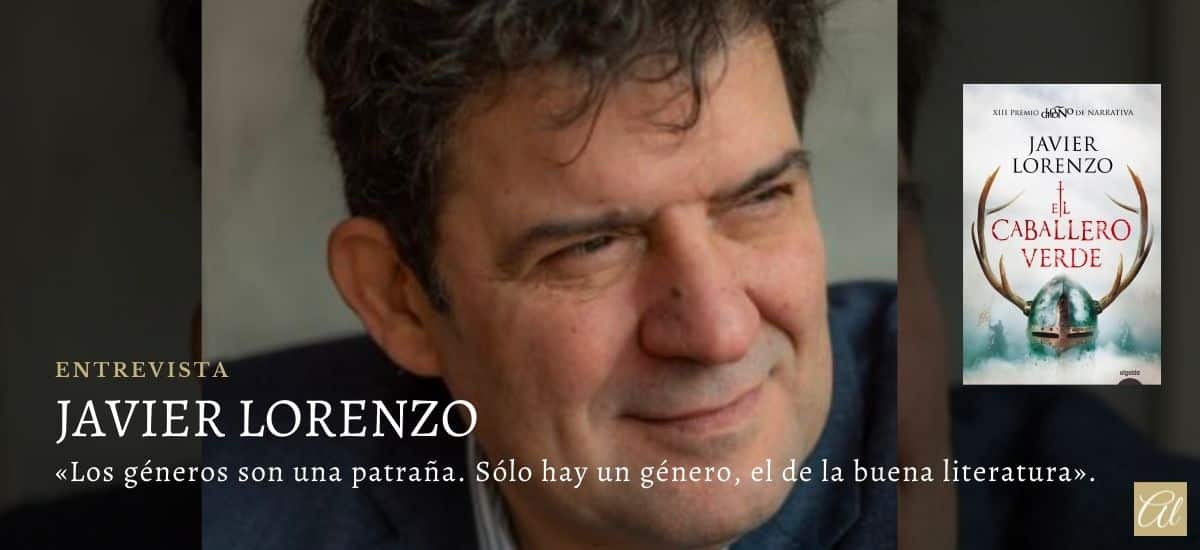
Photography: Javier Lorenzo, Twitter profile.
Xavier Lawrence was born in Madrid in 1960 and studied journalism. He has worked in several print and radio media, such as Cadena Ser or El Mundo. His career as a writer began with the last soldier, a title that brought him great success. He later published the sequel to it on The guardians of the taboo, and then followed The blue bug, set in the Spanish Civil War. His latest novel is The green knight. In this interview He tells us about her and more topics. I am very grateful for the time and kindness that she has dedicated to me.
Javier Lorenzo — Interview
- ACTUALIDAD LITERATURA: Your last published novel is The green knight. What inspired you the most about Sancho Martín, the historical figure he is based on?
JAVIER LORENZO: Apart from rescue another castaway from our unlimited and exciting history, the fact —unknown to me at the time— that there were many Spaniards who went to fight in the Holy Land. To the point that several popes prohibited them from participating in the Crusades, since the call was so powerful that it threatened the depopulation of their lands and, therefore, with the cessation of our particular crusade, the so-called Reconquest. On the other hand, that our hero -because it can be called that- came to meet with the sultan Saladino at his request it seemed to me an amazing detail and full of meaning. Of course, worthy of being fictionalized.
- AL: Can you remember any of your first readings? And the first story you wrote?
JL: As a child I even read the instructions for the drills. I remember that in Primary I asked my mother to give me the complete collection of The five, by Enyd Blyton. If he passed all of them in June, of course. In addition, all of Bruguera passed through my hands and I met Salgari, Stevenson, Zane Gray and, of course, with Julio Verne. The Adventures of Captain Hatteras or The mysterious Island -aside from his other best-known works—were fiercely devoured by my hungry, stupefied eyes. The Moon, the poles, the Maelstrom… That was a joy.
And the first thing I wrote was a poetry, definitely. To my mother, I guess. I'm not going to skip the cliché at this point. In any case, I always won the essay contests from my class, so I came upstairs and here I am.
- AL: A head writer? You can choose more than one and from all eras.
JL: In their own way, I think the three of them are alike, despite also being very different: Stendhal, Kafka y Hemingway. All three have limpid, deceptively simple prose. As Hemingway said when they told him about Faulkner: "I know all the damn words he writes, but I don't use them because I don't want to." Centuries will pass and his language will continue to be contemporary, effective and captivating. As for the Spaniards, Cela and Delibes, although curiously the only historical novel of the great Valladolid —The heretic— left me cold.
- AL: What character in a book would you have liked to meet and create?
JL: I doubt I would have liked to meet him: Pedro Paramo.
- AL: Any special habits or habits when it comes to writing or reading?
JL: I'm not picky, but I need silence and, to write, a previous margin of loneliness.
- AL: And your preferred place and time to do it?
JL: Many times I write of nightBut I should have changed that a long time ago. There is a boy who insists on going to school.
- AL: Are there other genres that you like?
JL: All those who write honestly. The genres are a hoax. There is only one genre, that of good literature, and the adjective given to it does not matter: black, children's, science fiction...
- AL: What are you reading now? And writing?
JL: Right now I'm hallucinating —it's not a set phrase, my brain is spinning— with a short novel from Transylvanian (of Hungarian descent, by name) Attila Bartis. Its titled The walk. Indescribable, schizophrenic, forceful and relentless. It seems written by a sinister and crazy mountebank. She is scaring me!
As for the write, I have an advanced stage of pregnancy novel which is not only not historical, but it's like nothing i've ever done until now. It is being a discovery. Every step is a surprise. And I do not add more.
- AL: How do you think the publishing scene is?
JL: I live, which is not little. They are to blame for the fact that readers are not yet a kind of top-secret and even satanic sect. My blessings to all. From the largest to the smallest. And come on, already put, for those who self-publish the books, too.
- AL: Is the moment of crisis that we are experiencing being difficult for you or will you be able to keep something positive for future stories?
JL: As difficult as anyone. But for me the crisis, pandemic and war are just coincidences. Someday, if you want, I'll tell you why.